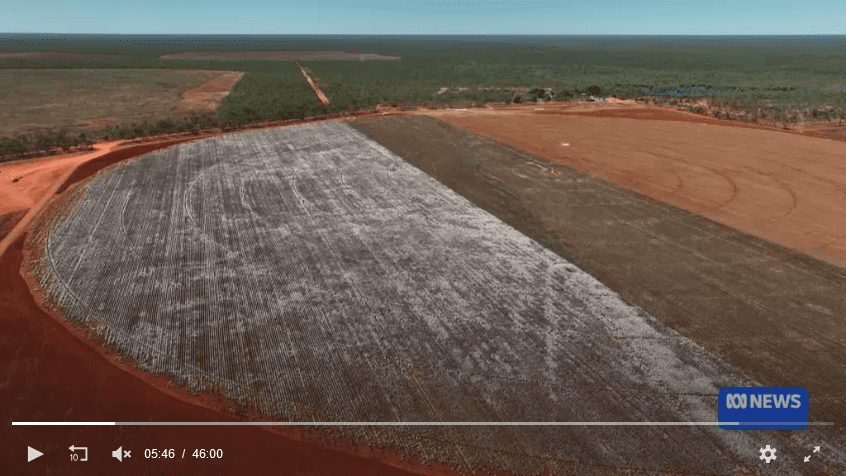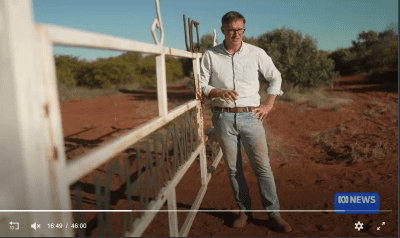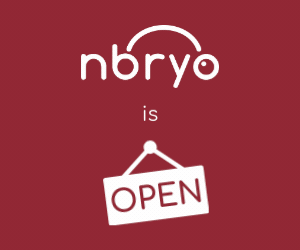

4 Corners’ Water Seize episode consists of aerial footage of cotton grown below centre-pivot irrigation within the NT. Supply: ABC
AUSTRALIA’S peak cotton physique, Cotton Australia, has been fast to reply to claims made by the Australian Broadcasting Company’s 4 Corners program in regards to the growing cotton business within the Northern Territory.
In its episode aired final night time and entitled Water Seize, 4 Corners made a number of claims referring to the rising of cotton utilizing unregulated and free underground water, and plans to construct dams on leased land on which to reap overland flows.
The episode included file footage of Tipperary Station chair Allan Myers, common supervisor David Connelly and his brother and Tipperary cotton supervisor Bruce Connolly talking about NT cotton, and the gin at Katherine, by which Tipperary is a serious investor, that opened final yr.
File footage additionally consists of an interview with former NT Farmers Affiliation chief govt officer Paul Burke.
New footage confirmed a number of properties, particularly Paspaley Properties’ Dry River Station, which the episode claims is rising cotton, and the Malcolm Harris-owned Ucharonidge Station, which is brazenly rising cotton.

Screenshot of 4 Corners reporter Angus Grigg on the gate of Ucharonidge Station. Picture: ABC
“Malcolm Harris says the cotton crop is being grown for its seed, which could be fed to cattle,” reporter Angus Grigg stated within the report.
Nevertheless, veterinarian, environmentalist, and impartial candidate for the seat of Katherine within the NT election being held on Saturday Sam Phelan refuted this declare, saying that cottonseed was solely round 15 p.c of the worth of the crop.
“Individuals are rising this for the fibre; the cottonseed is a byproduct,” Dr Phelan stated.
The episode additionally claims some NT land has been cleared with out a prior allow being issued, ostensibly for the aim of rising cotton, and that whereas NT cotton is being promoted as a dryland crop, irrigation methods are being put in to assist it.
Whereas the episode mentions a lot of NT leaseholders for his or her alleged involvement in cotton manufacturing, it’s harshest on NT Authorities coverage for its lack of regulation on land-use and water entitlements up to now.
NT Minister for Setting, Local weather Change and Water Safety Kate Worden was interviewed at size in this system to advocate the NT Authorities’s place on coverage across the rising of cotton, and irrigation usually.
This system confirmed or acknowledged makes an attempt to talk with a lot of NT leaseholders, none of which resulted in on-air interviews.
Thumbs down from Cotton Australia
In its assertion issued at this time, Cotton Australia stated it determined to not take up the chance to have interaction with 4 Corners for the Water Seize program.
“In our final engagement with 4 Corners, the Australian Communications and Media Authority discovered that ABC’s 4 Corners breached its personal Code of Follow on the difficulty of due impartiality and unduly favouring one perspective in a 2019 story on water infrastructure the place cotton was a spotlight,” Cotton Australia stated.
“On account of this and different experiences with 4 Corners, Cotton Australia took the deliberate determination to not interact with them on this program given their previous bias.”
 That episode, entitled Money Splash, aired on 8 July 2019, and checked out Federal Authorities expenditure on water infrastructure schemes within the Murrumbidgee Valley below the Murray-Darling Basin Plan.
That episode, entitled Money Splash, aired on 8 July 2019, and checked out Federal Authorities expenditure on water infrastructure schemes within the Murrumbidgee Valley below the Murray-Darling Basin Plan.
Following is Cotton Australia’s response to the Water Seize episode:
Cotton Australia is extraordinarily dissatisfied on the conduct of ABC’s 4 Corners program in delivering one other assault on the cotton business in final night time’s story on cotton within the Northern Territory.
Once more, final night time, 4 Corners portrayed a one-sided view of the business, disregarded reliable scientific analysis, made conclusions primarily based on repeated claims by activists, promoted the electoral ambitions of a key opponent of the business and irresponsibly raised alarmist claims about potential catastrophic outcomes and a devastated tourism business.
The primary claims are repeated under with the cotton business responses to every allegation.
Declare: Unsustainable ranges of water are being taken from aquifers threatening the Roper River, which can run dry.
Response: There is no such thing as a impartial proof to validate this declare. The CSIRO has printed its personal report which contradicts solutions the Roper River system will run dry. It’s available here.
The Chief Govt of the Newbie Fishermen’s Affiliation of the Northern Territory, David Ciaravolo rejects the Roper River claims.
In communication with the ABC’s Matt Brann Mr Ciaravolo states: “I’ve been on the Mataranka Water Advisory Committee for the previous seven years. And let me inform you, as an advocate for barramundi fishing and the Roper River, I have no concern that present or imminent water guidelines will lead to the Bitter Springs drying up, nor to the Roper River ceasing to movement.”
He says new water rules have made and can make issues higher, not worse.
Declare: Mataranka water ranges are dropping due to irrigation.
Response: This declare is unsubstantiated. Long-term monitoring and assessments present that floor water ranges are growing regardless of extraction commencing within the early 2000’s.
Declare: A 10GL water license is being given away at Larrimah to develop crops together with 800 Ha of cotton.
Response: There may be an utility which nominates a number of crops, together with 800 ha of cotton and that utility shouldn’t be but finalised. It is a matter for the person grower and the federal government to find out, contemplating their stringent water rules.
Declare: The solutions about financial profit from Cotton to the Territory are spurious with a questionable profit to the NT.
Response: This yr, round $38 million was generated by the NT cotton business by way of cotton, with most of that cash trickling down into the native economic system. Transport operators, contractors and farming provide firms are already benefiting from that financial exercise and extra jobs have been created.
Declare: The tourism sector could possibly be put in danger by irrigators rising cotton.
Response: That is scaremongering. There is no such thing as a independently validated proof to assist this and solely 4.5pc of the cotton crop is irrigated with over 95pc rain fed.
Declare: Farmers are utilizing pastoral leases to develop cotton once they shouldn’t.
Response: The regulator and the related Minister disagree, stating the apply is authorized. The pastoral functions information is available here.
Declare: The NT Authorities is ignoring scientists with their considerations.
Response: That is for the Northern Territory Authorities to reply. Be aware that a lot of the Board at activist group Setting Centre NT are additionally Charles Darwin College researchers, workers and college students.
Declare: Indigenous house owners are being ignored.
Response: The Northern Territory Authorities states First Nations individuals have a pivotal position in water entry as a result of excessive proportion of Aboriginal Land within the Northern Territory (each Land Rights and Native Title), and no matter their Conventional Proprietor standing, native individuals are actively consulted with by way of water allocation planning processes.
All pastoral growth functions, land or water bear a public submission interval. Throughout this era all related authorities and non-government organisations could make feedback on the proposed submission that the Consent Authority should then think about of their decision-making course of, this consists of floor fact visits from members of the Pastoral Land Board. All Indigenous stakeholders are given ample alternative, like all others, to make remark by way of the identical course of.
Declare: Some growers have nominated hay when making use of for permits to clear land and for water functions and but they develop cotton.
Response: In some circumstances, growers have held historic and long-term rights and entitlements to allow them to have interaction in agricultural cropping and their choices about which crops to develop can change in a rotational cropping system. Cotton has solely emerged as a viable possibility just lately and so it’s comprehensible that some could have nominated different crops when initially lodging their functions.
Declare: The cotton business sought a brand new class of water license relating to a apply often known as floodplain harvesting (overland movement) with a view to the institution of dams.
Response: Cotton Australia can categorically state that it has by no means sought to affect the overland movement coverage and neither is it conscious of another cotton consultant physique doing so.
Cotton Australia’s information in regards to the NT cotton business
- It at present has 13 cotton growers;
- 12,982ha planted, together with 575ha below irrigation;
- Water used is from present water allocations that beforehand would have been used to develop different crops;
- Any water used for irrigating cotton is from present water allocations utilizing groundwater;
- There are 407 water licences for agriculture in existence; solely 9 contain cotton;
- At present there isn’t a irrigated cotton grown with water extracted from a river or from wet-season flows;
- At this stage there are not any functions from cotton growers for wet-season movement water;
- Round 0.01pc of Australian cotton is grown within the NT.
Trending Merchandise










